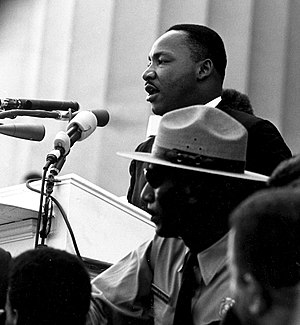A year and a half ago, I wrote a post about “the dream speech” by Martin Luther King, Jr. In it, I wrote the following:
…I will share how I, living in the country transformed by this moment, still respond to Dr. King’s words. When Dr. King says, toward the opening of the famous “I have a dream” speech:
Five score years ago, a great American, in whose symbolic shadow we stand today, signed the Emancipation Proclamation. This momentous decree came as a great beacon light of hope to millions of Negro slaves who had been seared in the flames of withering injustice. It came as a joyous daybreak to end the long night of their captivity.
But one hundred years later, the Negro still is not free. One hundred years later, the life of the Negro is still sadly crippled by the manacles of segregation and the chains of discrimination. One hundred years later, the Negro lives on a lonely island of poverty in the midst of a vast ocean of material prosperity. One hundred years later, the Negro is still languished in the corners of American society and finds himself an exile in his own land. And so we’ve come here today to dramatize a shameful condition.
I don’t hear him saying that, thanks to this speech, we’re all going to be free. I don’t hear him saying, “Pass the Voting Rights Act” and all will be fine. Those words are as apropos today as they were in 1963, and to even suggest that we are in a “post-racial” anything is, at best, willfully ignorant and disturbingly obtuse.
Dr. King then describes the march as coming to Washington to cash a check—a check of justice and equality promised by the framers of the Constitution and built on the backs of slaves. To cash a check that came in the form of an IOU—not to be redeemed during the slave’s lifetime, or the lifetimes of their children, grandchildren, or great grandchildren. An IOU promised and perpetually rejected. An IOU of such fundamental import, that freedom would be woven throughout the entirety of the Constitution.
The tenor of the speech, which you should read yourself (it’s pretty short—find it here), is about justice. Not the justice that a piece of legislation can bring, or simple shifting of attention could address, but that would require the dramatic alteration of our culture and reorientation of our very being to represent this type of justice. And how does Dr. King describe this justice? He describes GOD’s understanding of justice. He is talking about justice that flows out of us; a justice won by our labors and given to us by GOD.
It should surprise none of us that a leader villified by the conservative white community as “uppity” would become as innocuous a figure in our time as King has become. Discussions of race relations in the United States seem to require the opening statement: “let’s begin by recognizing how far we’ve come”. We bow before the common wisdom that demands that we celebrate that racism is still practiced, but illegal! That our systems reinforce segregation by income rather than race specifically. That discrimination based on race is passe, unlike sexual orientation, disability, or felony conviction, which is still wildly popular. That King’s daughter would still live in a world in which her worth to the labor market is still 77% of a man’s.
We are far too eager to forget how lonely King was at the end of his life and how angry liberals and conservatives alike were that King didn’t declare Mission Accomplished! when African-Americans won the right to vote. We are far too eager to forget that what King was for transcended race relations and modern society and that his dream was to usher in the Kingdom of GOD and with it all people would be granted not only legal equality, but social equality. That all of GOD’s children would respect and love one another regardless of their biological differences. That we would love one another, regardless of who they are, inside or out. This Dream is not just King’s dream, but Christ’s dream, GOD’s dream, and it still scares the heck out of us. It is still the most challenging dream we have for all of humanity. And few want it. And ironically, fewer Christians want it.
This month, let’s work toward achieving the Dream, personally and professionally. We can change the whole system if we wanted to.


Leave a Reply